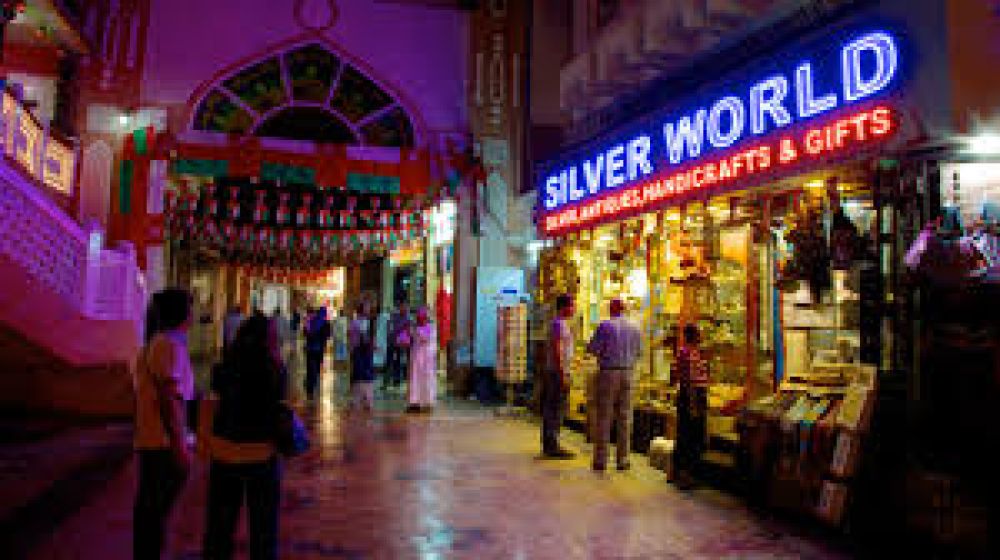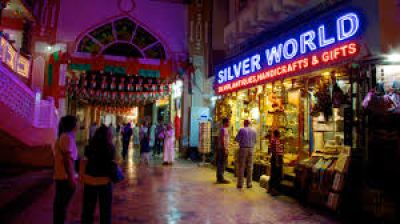

Mutrah Souq, also known as Al Dhalam Souq, is one of the oldest marketplaces in the Arab world. It's a place where the fragrance of incense fills the air, and the buzz of bargaining echoes through the corridors. As you walk through the labyrinthine alleyways, you'll be taken on a journey through time, with each shop offering a glimpse into Oman's rich cultural heritage. From traditional Omani hats known as 'Kummas' to beautiful handcrafted silver jewelry, the souq offers an array of goods that speak to the country's artistic and commercial history. Tourists can find intricately designed fabrics, vibrant lanterns, and aromatic spices among many other souvenirs. There's also the opportunity to sample local delicacies or enjoy a cup of traditional Omani coffee at a nearby café. A visit to Mutrah Souq is not just a shopping excursion, but an immersive experience in Omani culture and history.
While exploring Mutrah Souq, visitors should not miss the chance to taste the famous Omani Halwa, a traditional gelatinous dessert made from brown sugar, rosewater, and a mix of spices, often garnished with nuts. This sweet treat represents the hospitality of Omani culture and is usually served alongside coffee. Shops within the souq offer a variety of Halwa flavors, and it’s fascinating to watch the vendors prepare and package the dessert in ornate containers, which make for perfect gifts or souvenirs. The subtle differences in flavor, texture, and ingredients between different family recipes are evidence of the time-honored traditions that go into making this delicacy.
The ritual of drinking coffee is a fundamental aspect of Omani hospitality, often enjoyed with dates or Omani Halwa. In Mutrah Souq, you can visit small coffee houses or stalls where you can indulge in the rich flavor of freshly brewed Omani coffee. Typically mixed with cardamom and sometimes saffron or rosewater, this aromatic beverage is normally served in small cups and drunk in several sittings. Participating in this tradition allows visitors to engage with locals and learn about the customs and social significance of coffee in Omani society. It’s a warm, welcoming experience that gives tourists a taste of everyday life in Oman.
No visit to Mutrah Souq would be complete without delving into the scented world of Omani perfumes and incense. The souq is known for its vast selection of fragrances, from traditional attars—concentrated perfume oils—to the famous Frankincense, a resin obtained from the Boswellia tree that is indigenous to Oman. Buying these fragrances is a sensory adventure in itself, as the air is heavy with a mix of aromas, and the vendors are skilled in helping you select scents that appeal to your personal preferences. The sale and use of perfume in Oman is a cultural tradition, with specific fragrances often associated with certain occasions or times of day. Take the opportunity to learn about the history and cultural significance of these scents during your visit.
The area around Mutrah Souq presents a rich tapestry of Omani life and architecture, making it ideal for a cultural walk and photography tour. Start your journey at the picturesque Corniche, with views of the harbor and the Hajar Mountains in the distance. Photograph traditional dhows floating on the water and capture the essence of the bustling streets. The juxtaposition of the old and new, from the traditional-style buildings of the souq to the modern cityscape, provides a diverse range of subjects for photographers. Friendly locals often dressed in traditional attire, and the vibrant market scenes add a human element to your visual narrative, embodying the soul of Oman.
Embark on a historical tour to learn about the storied past of Muscat and its relationship to Mutrah Souq. An experienced guide will lead you through major landmarks, including the Portuguese forts, the Sultan's Al Alam Palace, and the Bait Al Zubair Museum. The tour provides context to the development of trade in the region and the significance of the souq as a hub for commerce and social interaction throughout history. Exploring these historical sites allows visitors to gain deeper insights into the origins of the souq and how Muscat evolved from a strategic port city into the vibrant capital of Oman.
Participate in a workshop to learn about traditional Omani crafts, a highlight being the art of Khous weaving, the creation of palm leaf baskets and mats. These workshops, often held within or near Mutrah Souq, provide hands-on experience in creating these traditional items under the guidance of skilled artisans. The process of making these crafts offers insight into the resourcefulness and creativity of the Omani people, who have long valued the sustainability and utility of natural materials. A workshop is a great opportunity to appreciate Oman's cultural heritage and leave with a unique, self-made souvenir.
Set sail from Mutrah Corniche on a traditional wooden dhow, just steps away from the souq, and enjoy a sunset cruise along the Muscat coastline. As the sun dips below the horizon, the sky turns into a mesmerizing canvas of colors, offering a splendid backdrop against the silhouette of the city and mountainous landscape. During the cruise, you'll have the chance to witness Muscat from a different perspective, with commentary on the historical significance and natural beauty of the region. This relaxing activity is perfect for winding down after a busy day of exploration and shopping in the souq.
An exploration of the culinary offerings in and around Mutrah Souq is a must for food enthusiasts. Join a guided food tour to sample an array of Omani dishes, such as the savory mashuai (spit-roasted kingfish), shuwa (slow-cooked marinated lamb), and the ever-popular kebabs. Visit local eateries, some of which have been in operation for decades, where you can also indulge in sweet treats like luqaimat (fried dough balls) and halwa. These tours not only deliver a variety of tastes but also provide an understanding of the ingredients and cooking methods that are distinctive to Omani cuisine.
For maritime history enthusiasts, a short trip from Mutrah Souq to the nearby shipyards offers a glimpse into the craft of traditional Omani shipbuilding. Oman has a rich seafaring history, and these shipyards are where you can observe craftsmen working on dhows, the wooden vessels that were historically used for trade and fishing. Learn about the construction techniques that have been passed down through generations and how these vessels have played a pivotal role in Oman's maritime heritage. The visit offers an educational and fascinating look at a craft that remains integral to Omani culture.
